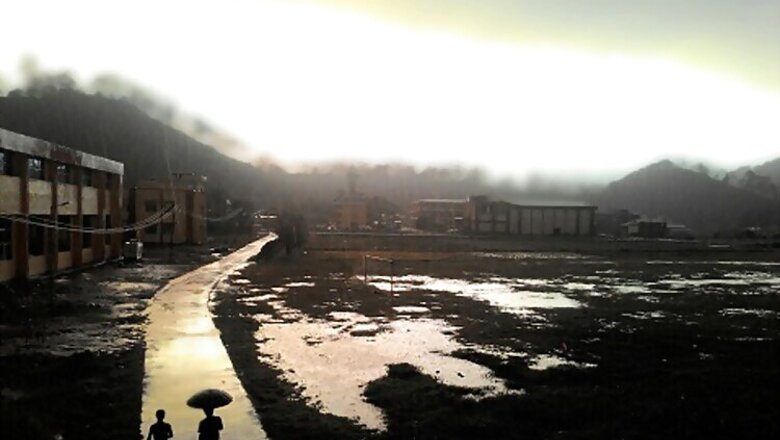
views
Constitution is not a mere lawyers document, it is a vehicle of Life, and its spirit is always the spirit of Age: BR Ambedkar
Envisioned to be the herald of democracy, the Constitution today has failed the tribals of Manipur. Nearing 150 days since the brutal killing of the 9 young civilians in Churachandpur, Manipur, people languish in agony for justice. On 31st August 2015, three bills were passed unanimously by the Manipur Legislative Assembly. These Bills - The Protection of Manipur People Bill, 2015, the Manipur Land Revenue and Land Reforms (Seventh Amendment) Bill, 2015, and the Manipur Shops and Establishments (Second Amendment) Bill, 2015 were a response to the earlier demand of the valley for introducing the Inner Line Permit. The hill tribes anticipated the potential threat to their rights over land and identity and condemned the Bills. Youth from Churachandpur, impassioned with the rage, took to the streets protesting against the political ploy of the administration. The protest soon turned violent and in the clash, nine young civilians were killed by brutal State police forces. Out of the nine, the youngest to have lost his life was an eleven year old boy who was shot dead by the police.
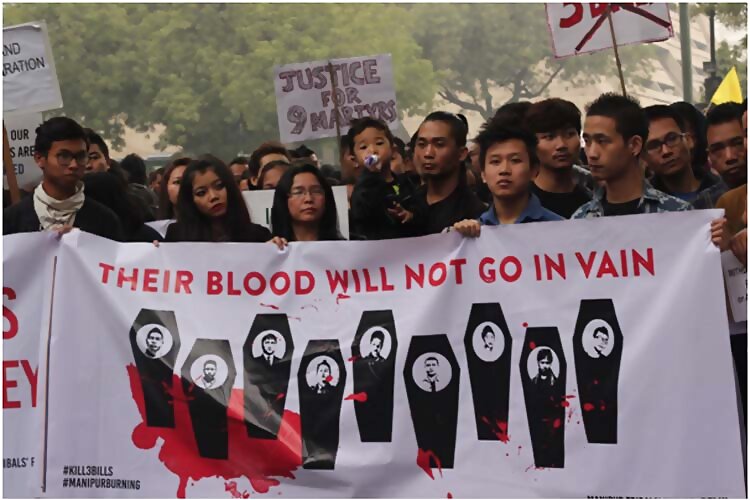
Young men with visions for a democratic future lost their lives in what would be termed as collateral damage. Churachandpur has been burning since that day as they lost 9 of their sons to the hostile police who refused to even register FIRs against the fatalities. But this has not discouraged the tribal population. It has enraged them further and has given them the conviction to be counted as equal stakeholders in decision making.
As a form of protest, the families of the 9 martyrs have refused to bury the bodies until the government demands are met and the three Bills are withdrawn. The tribals anticipate that the Bills would threaten the very basic rights of the tribals and makes them refugees in their own land.
According to the tribal community, there has, historically, been unrest between the hill tribes and the non-tribal Meitiei population. Meiteis dominate the administration of Manipur, occupying a majority in the Assembly. Tribal community claims that the Hill Areas have always been neglected and discriminated culturally, politically and more evidently, economically, as can be seen in terms of development of roads, schools and hospitals. The funds from the central government for development of Manipur region are fudged and siphoned by the valley administration leaving the hills to remain underdeveloped and inaccessible.
The introduction of these three bills makes that narrative stronger as it would challenge the identity of the hill tribes and threaten their land rights. The Protection of Manipur People Bill, 2015 defines the "Manipur People" in Clause (b) of Section 2 of the Bill as those whose names (and their descendants) are in:
# National Register of Citizens, 1951
# Census Report 1951
# Village Directory of 1951
And their descendants who have contributed collective social, cultural, and economic life of Manipur.
In 1951, most of the Hill Areas were not accessible by road and the situation is the same even today. By making the three antique and outdated registers as a yardstick and making 1951 as the cut-off year will drastically exclude a majority of the tribal population from the purview of the Clause (b) of Section 2 and place them under Clause (c) as Non-Manipur person. The ambiguous and subjective nature of definition of “Manipuri people” and the issue of ‘contribution by the descendants’ is such that the same can be interpreted in all sorts of diverse ways. This assertion legitimizes the apprehension of the tribal population that it is a strategic political ploy of the Manipur government to gain access over tribal land. The apprehension is that the Bill is indicative of the deliberate intention of the State Government for exclusion of large population of tribal people as Non-Manipur persons. Section 9 of the Bill states that ‘no suit, prosecution or other legal proceedings shall lie against any officer of the State Government for anything which is in good faith done or intended to be done under this Act’. The extreme powers and immunity from prosecution accorded to officers under this section is dangerous and reeks of malice. The Officers, who will invariably be from the dominant Meitei community, are bound to use this impunity against the tribals.
As a response to the strife back home, Manipur tribals in Delhi came together in solidarity and formed the Manipur Tribals’ Forum Delhi (MTFD) overnight to harness political support and appeal to the Central Government to intervene and take cognizance of their long-neglected issues. The MTFD has been staging a daily sit-in protest at Jantar Mantar since November 4, 2015. The MTFD has met several political figures including Home Minister Rajnath Singh who has provided verbal assurance many times with no real action in foresight. They continue to maintain that the issue is a State matter. The State Government has continued to maintain that the killings are an ‘unfortunate incident’ while refusing to listen to the Charter of Demands submitted by the tribal leaders led by the Joint Action Committee and other apex tribe councils.
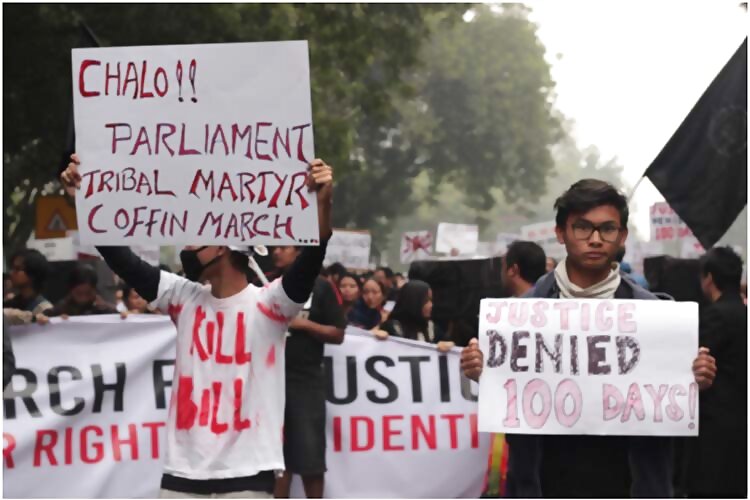
On 26th January, as Delhi shone in the glory of the national flag celebrating the 67th year of our Republic, the MTFD gathered with supporters wearing sack clothes and hoisting black flags to mourn the brutal killings of their people whose bodies remain unburied till today, and to agitate over the unconstitutional passing of the Bills. The tribal people of Manipur, stand united, for 150 days now, asking the government this Republic day if their political interests in Manipur have become larger than the Constitution and whether their political gimmick is worth 9 young lives who died to uphold democracy for their people.
"We have remained silent for too long now. We have faced severe injustices. But no more. We have to remind the government what Republic Day really stands for. Republic day celebrates the day India gave to itself the constitution. Tribals are also supposedly a part of the same republic that hold the constitution in high regard. This is what we are demanding on Republic Day from the government. We want them to invoke Article 371C and respect the constitution. If they do not uphold the constitution then they shouldn’t be celebrating the Republic Day with so much gusto either. Whose nation and whose republic is it, if not the peoples’?” said Romeo Hmar, the convener of the MTFD.
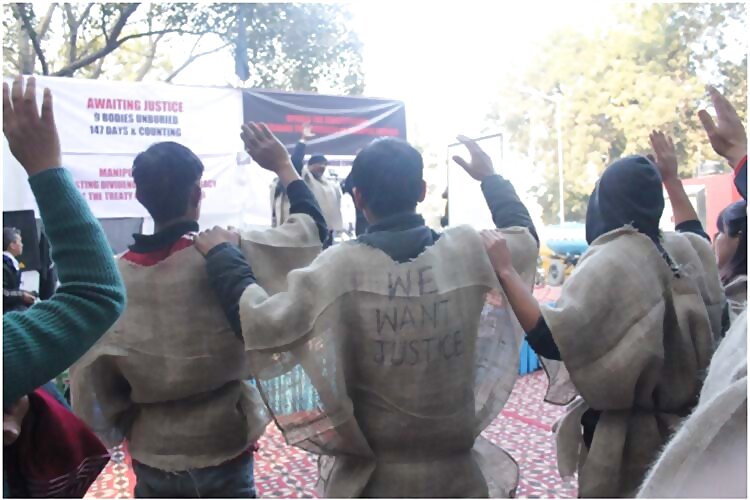
For the short-term, they demand the withdrawal of the 3 bills and the protection of their lands through constitutional safeguards such as the Sixth Schedule provisions, but for the long term, they envision political separation of the Hills Areas from the state of present Manipur as the only way forward to bring lasting peace and development in the region.
(Disclaimer: The writer's views are personal, not that of CNN-IBN/IBNLIVE.)












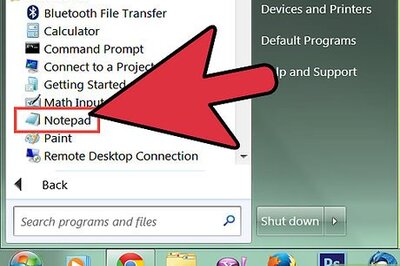
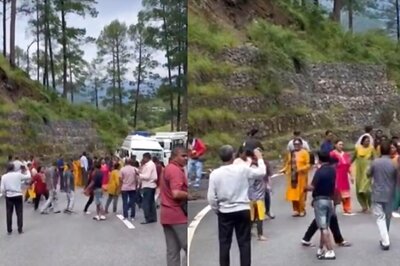






Comments
0 comment